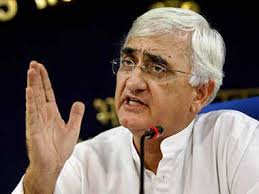New Delhi, Oct 20: Kashmir is an integral part of India and no one should raise a question on that, said External Affairs Minister Salman Khurshid.

He expressed concern over repeated ceasefire violations at the Line of Control and hoped these do not result in any more casualties. He, however, rejected suggestions that these have led to a collapse of the truce between the two neighbours.
Khurshid also said that any US economic aid to Pakistan must not be used in a manner that is detrimental to India's security and strategic interests and hoped that Washington will keep that in mind as a "good strategic partner".
"There is no way in which India will accept any intervention on an issue that is entirely accepted in the Simla Agreement as a bilateral issue between India and Pakistan," he told NDTV.
He said Kashmir is an integral part of India and no one should raise a question on that. "It is a waste of time for anybody no matter how eminent to be even trying to question it," he said.
On whether the ceasefire has collapsed, he said, "I don't think that is true. There are many violations. It is a large number of small armed fires. It is unacceptable and certainly counter-productive. But I don't think we can at this point say that ceasefire has collapsed. That would not be a correct assessment of the situation.
On US economic aid to Pakistan, Khurshid said, "I hope this is done keeping India's interests in mind as United States always assures us."
Ahead of his meeting with President Barack Obama, Sharif today sought US intervention in resolving the Kashmir issue.
"Though India did not want such (third party) intervention, but the world powers should get involved to resolve the (Kashmir) issue," he told reporters in London during a stopover while on his way to US wherein he will meet Obama on Wednesday.
"India and Pakistan both were nuclear powers and the region was a nuclear flash point," he said. About Sharif's comments on nuclear weapons, Khurshid said, "This is not new. We should concentrate on the important thing that the elements of dialogue that have been obstructed, that have been undermined and slowed down because of the events that have happened at the Line of Control on the border."
Sharif said for the last 60 years both sides were entangled in an arms race. "The situation can become dangerous. India has nuclear bomb, so do we; India develops missiles, so do we. There should be a limit to it. We all should think about it," he was quoted as saying.
According to Khurshid, the important thing was to ensure peace and tranquility and complete compliance of the ceasefire of 2003, to which Pakistan had willingly agreed.
On the repeated ceasefire violations, he said, "It is of course a problem and we need to take it more seriously. But the Army is well prepared. This is an area that is best left to the Army.
"Of course, it is an upsetting inconvenience. I think we will be able to handle it. As long as we have no casualties, the violations remain an irritant. The casualties add to the tragedy and the pathos and I hope that we will not see any more casualties."
On the straining of relations with China on issue of stapled visas, Khurshid said India does not accept stapled visas.
"We don't accept stapled visas. We certainly don't accept anyone assuming or saying or establishing a case that parts of Indian territory actually belongs to them... China or any other country," he said.
The Minister said the Indian perception is totally different from that of China on this issue, but added "the issue of Arunachal Pradesh needs to be addressed before the larger issue of bilateral visa regime."






Comments
Add new comment